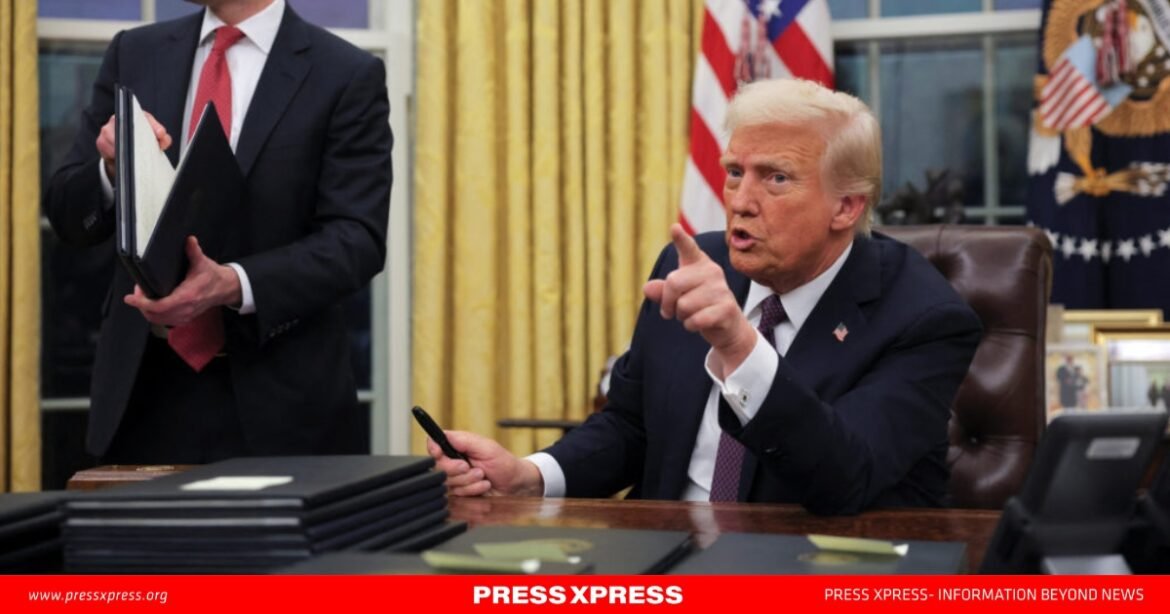Donald J. Trump returned to the White House as the 47th president of the United States, launching his second term with a rapid series of executive actions that underscored his commitment to reshaping U.S. policy both at home and abroad.
At 78, Trump becomes the oldest president to take office and only the second in U.S. history to return to power after losing re-election, following Grover Cleveland in 1893. His inaugural address struck a triumphant tone, declaring, “America’s decline is over,” as he outlined plans to undo Biden-era policies and prioritize his “America First” agenda.
Executive Orders Signal Immediate Action
In his first hours back in office, Trump signed more than a dozen executive orders, addressing issues ranging from immigration and energy to government reform and foreign policy. Many of the actions reignite debates over his first-term priorities, setting the stage for legal and political challenges.
Immigration: A Return to Hardline Policies
Trump declared a national emergency at the U.S.-Mexico border, reintroducing measures aimed at curbing illegal immigration. These included the redeployment of U.S. troops, the resumption of border wall construction, and the reinstatement of the “Remain in Mexico” policy, which forces asylum seekers to wait in Mexico for their court hearings.
In a contentious move, Trump signed an order attempting to end birthright citizenship for children of undocumented immigrants. While the policy is expected to face significant legal challenges, Trump framed it as a necessary step to safeguard national sovereignty. Additionally, he directed a halt to the CHNV program, a Biden-era initiative that allowed up to 30,000 migrants from Cuba, Haiti, Nicaragua, and Venezuela to legally enter the U.S. each month.
Energy: Reversing Biden’s Climate Agenda
Trump swiftly withdrew the U.S. from the Paris climate accord for the second time, calling it “a globalist scheme” that harmed American workers. He declared a national energy emergency, emphasizing a focus on domestic oil and gas production while freezing federal subsidies for renewable energy projects.
“Drill, baby, drill,” Trump said during a press event, promising to lower energy costs and reduce foreign dependence. He also directed federal agencies to halt new leases for wind farms and revoked several Biden-era green energy initiatives tied to the Inflation Reduction Act.
Capitol Riot Pardons
In one of his most controversial actions, Trump pardoned nearly 1,600 individuals convicted in connection with the January 6, 2021, Capitol riots. He characterized the pardons as a correction of political overreach, calling the rioters “Americans who were unfairly targeted.” Critics argue the move undermines accountability for the attack on Congress.
Economic and Regulatory Shifts
Trump signed an order mandating a freeze on federal hiring—except for military and public safety roles—and halted the implementation of new regulations until his administration reviews them. He also rescinded nearly 80 Biden-era regulations, including several related to workplace safety and environmental protections.
On the economic front, Trump directed federal agencies to explore strategies for reducing inflation, including lowering the costs of housing, healthcare, and household essentials. The directive lacked specifics, with agencies given 30 days to report back.
Foreign Policy: ‘America First’ Redux
Internationally, Trump reinstated his hallmark “America First” policies. He announced a withdrawal from the World Health Organization, criticizing its pandemic response, and paused foreign aid programs, pending a review of their alignment with U.S. interests.
On trade, Trump signaled a return to tariffs, directing officials to review agreements with Canada, Mexico, and China. He pledged import duties of up to 25% on Canada and Mexico and as high as 60% on Chinese goods, calling existing trade relationships “unfair to American workers.”
Trump also tempered expectations for immediate action on Ukraine, saying he would meet Russian President Vladimir Putin to discuss peace but insisted, “Russia must first make meaningful concessions.”
Historic Presidency Resumes
Trump’s return to power comes with unprecedented distinctions. He is the first convicted felon to serve as president, following a conviction related to a hush money payment during his 2016 campaign. However, his supporters view his political comeback as a vindication of his policies and leadership style.
The early days of Trump’s second term suggest an administration focused on rapid and sweeping changes, with far-reaching implications for the U.S. economy, environment, and foreign relations. As legal battles loom and critics mobilize, Trump remains undeterred, vowing to “restore American greatness” with his characteristic boldness.


